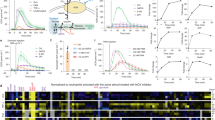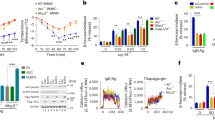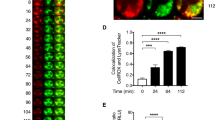Abstract
In common with other cells which use intracellular Ca2+ to mediate specific cell function, when rabbit neutrophils are stimulated with specific agonists the rate of metabolism of phosphatidylinositol (PI) increases1–3. This is normally measured as the incorporation of radioactive phosphate or inositol into PI, but these reactions are presumed to be secondary processes following the initial breakdown of pre-existing PI to diacylglycerol4. The radioactive labels are incorporated during the step wise resynthesis of PI via phosphatidic acid (PA). It has been suggested that in the sequence of biochemical events, starting with the binding of the ligand to a receptor, and finally resulting in the expression of cellular activity, the breakdown of PI is an early event immediately directed by activation of the receptor1,4. This could then control the increase in cytoplasmic Ca2+ and other processes dependent on this. Here we report an analysis of the temporal relationship between these phos-pholipid changes and cell stimulation. Our evidence suggests that in neutrophils, PI breakdown and PA labelling are both consequences and not causes of a rise in intracellular Ca2+.
This is a preview of subscription content, access via your institution
Access options
Subscribe to this journal
Receive 51 print issues and online access
$199.00 per year
only $3.90 per issue
Buy this article
- Purchase on Springer Link
- Instant access to full article PDF
Prices may be subject to local taxes which are calculated during checkout
Similar content being viewed by others
References
Michell, R. H. Biochim. biophys. Acta 415, 81–147 (1975).
Cockcroft, S., Bennett, J. P. & Gomperts, B. D. FEBS Lett. 110, 115–118 (1980).
Bennett, J. P., Cockcroft, S. & Gomperts, B. D. Biochim. biophys. Acta 601, 584–591 (1980).
Michell, R. H., Jafferji, S. S. & Jones, L. M. Adv. exp. Med. Biol. 83, 447–465 (1977).
Bennett, J. P., Cockcroft, S. & Gomperts, B. D. Nature 282, 851–853 (1979).
O'Flaherty, J. P. & Ward, P. A. Semin. Hemat. 16, 163–174 (1979).
Showell, H. J. et al. J. exp. Med. 143, 1154–1169 (1976).
Naccache, P. H., Volpi, M., Showell, H. J., Becker, E. L. & Sha'afi, R. I. Science 203, 461–463 (1979).
Salmon, D. M. & Honeyman, T. W. Nature 284, 344–345 (1980).
Putney, J. W., Weiss, S. J., van de Walle, C. M. & Haddas, R. A. Nature 284, 345–347 (1980).
Gomperts, B. D., Cockcroft, S., Bennett, J. P. & Fewtrell, C. M. S. J. Physiol, Paris 76, 383–393 (1980).
Bell, R. L. & Majerus, P. W. J. biol. Chem. 255, 1790–1792 (1980).
Michell, R. H. & Jones, L. M. Biochem. J. 138, 47–52 (1974).
Skipski, V. P., Peterson, R. F. & Barclay, M. Biochem. J. 90, 374–378 (1964).
Author information
Authors and Affiliations
Rights and permissions
About this article
Cite this article
Cockcroft, S., Bennett, J. & Gomperts, B. Stimulus–secretion coupling in rabbit neutrophils is not mediated by phosphatidylinositol breakdown. Nature 288, 275–277 (1980). https://doi.org/10.1038/288275a0
Received:
Accepted:
Issue Date:
DOI: https://doi.org/10.1038/288275a0
This article is cited by
-
Signal transduction in cells following binding of chemoattractants to membrane receptors
Virchows Archiv B Cell Pathology (1988)
-
Is phosphatidylinositol now out of the calcium gate?
Nature (1982)
Comments
By submitting a comment you agree to abide by our Terms and Community Guidelines. If you find something abusive or that does not comply with our terms or guidelines please flag it as inappropriate.



